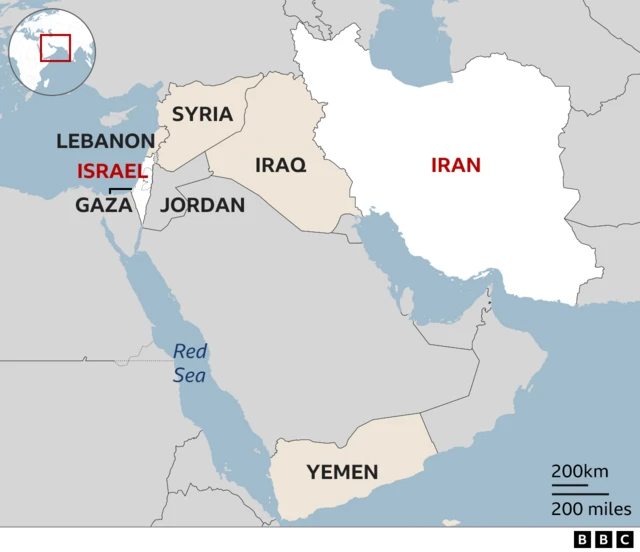Syllabus: GS2/IR
Context
- After the IAEA resolution accused Iran of nuclear non-compliance (first such resolution in two decades), Israel launched Operation Rising Lion, a coordinated military strike targeting Iran’s nuclear and missile infrastructure.
About
- Israeli officials have described this operation as an “existential battle” to eliminate Iran’s ability to pose a long-term threat to Israel.
- The two states have been at conflict since the founding of the Islamic Republic in 1979, but Israel’s attacks are a definite major escalation of the conflict.

Iran’s Proxy Warfare Strategy
- Over the years, Iran has developed a network of armed non-state groups across the region to exert influence and challenge Israel without engaging directly.
- These include: Hamas in Palestine, Hezbollah in Lebanon, Houthis in Yemen and Popular Mobilisation Forces (PMF) in Iraq.
- This proxy model has allowed Iran to:
- minimize its own risks and costs;
- retain a layer of deniability while supporting actions against Israel;
- tie down Israeli military capabilities across multiple fronts.
- Strategic Impact of Iran’s Proxy Network: Through this strategy, Iran has managed to extend its influence well beyond its borders, impacting areas as far as the Mediterranean Sea, the Red Sea and the northern Arabian Sea.
- This indirect warfare has helped Iran strengthen its geopolitical position without triggering large-scale retaliation—until now.
Israel’s Ongoing Dilemma with Proxies
- Despite repeated military strikes against Iran-backed groups, Israel has been unable to completely eliminate or neutralize them.
- For instance, Hamas continues to operate in Gaza despite significant Israeli military action.
- Hezbollah still poses a threat from Lebanon.
- The Houthis have withstood Israeli-aligned efforts despite attacks on infrastructure like the Sanaa airport.
- Many of these groups, except Hamas, are heavily dependent on Iranian support, especially in terms of weapons and training.
Shift in Israeli Military Strategy
- Israel appears to have concluded that targeting these proxies individually is not enough to ensure long-term security.
- The new approach targets the root of the problem — Iran itself, which supports and sustains the “Axis of Resistance.”
- Previous direct confrontations between the two countries in 2024 did not change the strategic balance. However, they revealed that many regional countries tacitly support Israel’s stance against Iran.
Implications of the Iran-Israel Conflict
- Escalation of Proxy Conflicts: Iran’s regional proxies — Hamas, Hezbollah, Houthis, and PMF — may retaliate, opening multiple fronts and turning the war into a wider Middle Eastern conflict.
- Destabilization of Fragile States: Countries like Lebanon, Iraq, Syria, and Yemen could witness a surge in violence, leading to internal political chaos and humanitarian crises.
- Maritime Insecurity: Key shipping routes like the Strait of Hormuz, Bab el-Mandeb, and Eastern Mediterranean may face threats, disrupting global trade and energy supply.
- Oil Price Surge: A direct war involving Iran — a major oil producer — risks disrupting global oil exports, potentially triggering a spike in oil prices and inflation worldwide.
- Derailment of Iran Nuclear Deal Talks: Ongoing efforts to revive the Joint Comprehensive Plan of Action (JCPOA) are likely to collapse, ending hopes for a peaceful nuclear settlement.
- Strengthening Iran’s Resolve: Israeli strikes on nuclear facilities may encourage Iran to accelerate its nuclear weapons program under the pretext of national defense.
- Arms Race in the Region: Gulf countries like Saudi Arabia may push for nuclear capabilities, intensifying the regional arms race.
- Reconfiguration of Regional Alliances: Arab states fearful of Iranian aggression may deepen cooperation with Israel.
- Regional powers like Turkey may recalibrate their roles to balance influence, while Russia may attempt to exploit the crisis for strategic gains.
- India’s Strategic and Economic Concerns: Over 60% of India’s crude oil comes from the Middle East; instability can disrupt supplies and widen the current account deficit.
- Millions of Indian citizens work in the Gulf; escalation may require emergency evacuations and increase remittance risk.
- India will have to balance relations between Israel, Iran, and Arab countries, maintaining neutrality while protecting its strategic interests.
Source: IE
| Read this in Hindi: इजराइल-ईरान संघर्ष |
Previous article
District & State Level Cells: Forest Rights Act, 2006
Next article
India and France Agree to Intensify Cooperation